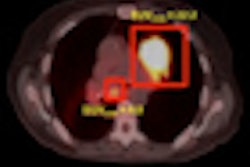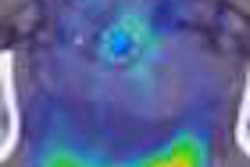Maximum standardized uptake value (SUVmax) may be a significant and clinically independent marker to indicate progression-free survival in stage I non-small cell lung cancer (NSCLC) patients treated with stereotactic body radiation therapy (SBRT), according to a study presented at the Cancer Imaging and Radiation Therapy Symposium.
The study included 95 patients with medically inoperable NSCLC (median age, 77 years). All patients had peripheral tumors, and none had previously received treatment for lung cancer.
Prior to SBRT, all patients had a PET/CT scan with pretreatment SUVmax assessment. At a median follow-up of 15 months, median overall survival was 25.3 months and progression-free survival was 40.3 months. Cox proportional hazards regression was performed to determine whether SUVmax, age, Karnofsky score, gender, tumor size/T-stage, or smoking history influenced outcomes.
"If SUVmax is assessed prior to radiation therapy, specific strategies could be developed to tailor treatments for patients, which would, in turn, provide them with the best chance at a longer and disease-free survival," noted lead study author Zachary Horne, a 2013 MD candidate at George Washington University School of Medicine. "Accurate anatomical and functional imaging and assessment, such as SUVmax, can help us achieve improved outcomes for patients."
The symposium is sponsored by the American Society for Radiation Oncology (ASTRO) and RSNA.



















